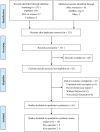Does taking an angiotensin inhibitor increase the risk for COVID-19? - a systematic review and meta-analysis
- PMID: 33886504
- PMCID: PMC8109111
- DOI: 10.18632/aging.202902
Does taking an angiotensin inhibitor increase the risk for COVID-19? - a systematic review and meta-analysis
Abstract
Because SARS-COV2 entry into cells is dependent on angiotensin converting enzyme 2 (ACE2) and angiotensin converting enzyme inhibitors (ACEIs) or angiotensin receptor blockers (ARBs) increase ACE2 activity, the safety of ACEI/ARB usage during the coronavirus disease 2019 (COVID-19) pandemic is a controversial topic. To address that issue, we performed a meta-analysis following The Preferred Reporting Items for Systematic Reviews and Meta-Analyses guidelines. Searches of the Embase, MEDLINE, PubMed, and Cochrane Library databases identified 16 case-control studies examining the effect of ACEI/ARB on the incidence of COVID-19 and its severity. ACEI/ARB usage was associated with an increased risk of COVID-19 morbidity (odds ratio (OR) 1.20, 95% confidence interval (CI) 1.07-1.33, P=0.001) among the general population but not in a hypertensive population (OR 1.05, 95% CI 0.90-1.21, P=0.553). ACEI/ARB usage was not associated with an increased risk of COVID-19 morbidity (coefficient 1.00, 95% CI 1.00-1.00, P=0.660) when we adjusted for hypertension in the general population. ACEI/ARB usage was also not associated with an increased risk of severe illness (OR 0.90, 95%CI 0.55-1.47, P=0.664) or mortality (OR 1.43, 95%CI 0.97-2.10, P=0.070) in COVID-19 patients. Our meta-analysis revealed that ACEI/ARB usage was not associated with either the increased risk of SARS-COV2 infection or the adverse outcomes in COVID-19 patients.
Keywords: COVID-19; angiotensin converting enzyme inhibitors; angiotensin receptor blockers; angiotensin-converting enzyme 2; coronavirus disease 2019.
Conflict of interest statement
Figures




Similar articles
-
The use of renin-angiotensin-aldosterone system (RAAS) inhibitors is associated with a lower risk of mortality in hypertensive COVID-19 patients: A systematic review and meta-analysis.J Med Virol. 2021 Mar;93(3):1370-1377. doi: 10.1002/jmv.26625. Epub 2020 Nov 10. J Med Virol. 2021. PMID: 33095513
-
A systematic review and meta-analysis to evaluate the clinical outcomes in COVID-19 patients on angiotensin-converting enzyme inhibitors or angiotensin receptor blockers.Eur Heart J Cardiovasc Pharmacother. 2021 Mar 15;7(2):148-157. doi: 10.1093/ehjcvp/pvaa064. Eur Heart J Cardiovasc Pharmacother. 2021. PMID: 32542337 Free PMC article.
-
Association Between Renin-Angiotensin-Aldosterone System Inhibitors and Clinical Outcomes in Patients With COVID-19: A Systematic Review and Meta-analysis.JAMA Netw Open. 2021 Mar 1;4(3):e213594. doi: 10.1001/jamanetworkopen.2021.3594. JAMA Netw Open. 2021. PMID: 33787911 Free PMC article.
-
Hypertension, medications, and risk of severe COVID-19: A Massachusetts community-based observational study.J Clin Hypertens (Greenwich). 2021 Jan;23(1):21-27. doi: 10.1111/jch.14101. Epub 2020 Nov 21. J Clin Hypertens (Greenwich). 2021. PMID: 33220171 Free PMC article.
-
Safety of ACEi and ARB in COVID-19 management: A retrospective analysis.Clin Cardiol. 2022 Jul;45(7):759-766. doi: 10.1002/clc.23836. Epub 2022 Apr 28. Clin Cardiol. 2022. PMID: 35481554 Free PMC article.
Cited by
-
Meta-analysis of the association between angiotensin pathway inhibitors and COVID-19 severity and mortality.Syst Rev. 2021 Sep 7;10(1):243. doi: 10.1186/s13643-021-01802-6. Syst Rev. 2021. PMID: 34488897 Free PMC article.
-
Potential use of renin-angiotensin-aldosterone system inhibitors to reduce COVID-19 severity.Rev Port Cardiol. 2023 Apr;42(4):373-383. doi: 10.1016/j.repc.2022.02.014. Epub 2023 Mar 7. Rev Port Cardiol. 2023. PMID: 36893838 Free PMC article. Review.
-
Repurposed drug studies on the primary prevention of SARS-CoV-2 infection during the pandemic: systematic review and meta-analysis.BMJ Open Respir Res. 2023 Aug;10(1):e001674. doi: 10.1136/bmjresp-2023-001674. BMJ Open Respir Res. 2023. PMID: 37640510 Free PMC article.
-
Evaluating the Role of the Renin-angiotensin System in COVID-19: Implications for ACE Inhibitor and ARB Use During SARS-CoV-2 Infection.J Cell Immunol. 2024;6(6):255-265. doi: 10.33696/immunology.6.213. J Cell Immunol. 2024. PMID: 40417281 Free PMC article.
-
Renin-Angiotensin Aldosterone System Inhibitors and COVID-19: A Systematic Review and Meta-Analysis Revealing Critical Bias Across a Body of Observational Research.J Am Heart Assoc. 2022 Jun 7;11(11):e025289. doi: 10.1161/JAHA.122.025289. Epub 2022 May 27. J Am Heart Assoc. 2022. PMID: 35624081 Free PMC article.
References
-
- Hoffmann M, Kleine-Weber H, Schroeder S, Krüger N, Herrler T, Erichsen S, Schiergens TS, Herrler G, Wu NH, Nitsche A, Müller MA, Drosten C, Pöhlmann S. SARS-CoV-2 Cell Entry Depends on ACE2 and TMPRSS2 and Is Blocked by a Clinically Proven Protease Inhibitor. Cell. 2020; 181:271–280.e8. 10.1016/j.cell.2020.02.052 - DOI - PMC - PubMed
Publication types
MeSH terms
Substances
LinkOut - more resources
Full Text Sources
Other Literature Sources
Medical
Miscellaneous

